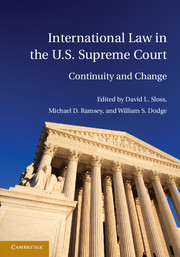Book contents
- Frontmatter
- Contents
- List of Contributors
- Table of Cases
- Acknowledgments
- Introduction
- PART I FROM THE FOUNDING TO THE CIVIL WAR
- PART II FROM THE CIVIL WAR TO THE TURN OF THE CENTURY
- PART III FROM THE TURN OF THE CENTURY TO WORLD WAR II
- PART IV FROM WORLD WAR II TO THE NEW MILLENNIUM
- PART V INTERNATIONAL LAW IN THE U.S. SUPREME COURT IN THE TWENTY-FIRST CENTURY
- V.A TREATIES AFTER 2000
- V.B CUSTOMARY INTERNATIONAL LAW AFTER 2000
- V.C INTERNATIONAL LAW AND CONSTITUTIONAL INTERPRETATION AFTER 2000
- Main Essay – International Law and Constitutional Interpretation in the Twenty-First Century: Change and Continuity
- Response – Essay Why Constitutional Comparativism Is Different: A Response to Professor Tushnet
- Response Essay – Judicial Dialogue in Roper: Signaling the Courts Emergence as a Transnational Legal Actor?
- V.D INTERNATIONAL LAW AND STATUTORY INTERPRETATION AFTER 2000
- V.E INTERNATIONAL LAW AND THE WAR ON TERROR
- VI CONCLUSION
- Index
- References
Main Essay – International Law and Constitutional Interpretation in the Twenty-First Century: Change and Continuity
Published online by Cambridge University Press: 05 July 2011
- Frontmatter
- Contents
- List of Contributors
- Table of Cases
- Acknowledgments
- Introduction
- PART I FROM THE FOUNDING TO THE CIVIL WAR
- PART II FROM THE CIVIL WAR TO THE TURN OF THE CENTURY
- PART III FROM THE TURN OF THE CENTURY TO WORLD WAR II
- PART IV FROM WORLD WAR II TO THE NEW MILLENNIUM
- PART V INTERNATIONAL LAW IN THE U.S. SUPREME COURT IN THE TWENTY-FIRST CENTURY
- V.A TREATIES AFTER 2000
- V.B CUSTOMARY INTERNATIONAL LAW AFTER 2000
- V.C INTERNATIONAL LAW AND CONSTITUTIONAL INTERPRETATION AFTER 2000
- Main Essay – International Law and Constitutional Interpretation in the Twenty-First Century: Change and Continuity
- Response – Essay Why Constitutional Comparativism Is Different: A Response to Professor Tushnet
- Response Essay – Judicial Dialogue in Roper: Signaling the Courts Emergence as a Transnational Legal Actor?
- V.D INTERNATIONAL LAW AND STATUTORY INTERPRETATION AFTER 2000
- V.E INTERNATIONAL LAW AND THE WAR ON TERROR
- VI CONCLUSION
- Index
- References
Summary
Supporting the proposition that deprivation of citizenship “has grave practical consequences,” Justice Arthur Goldberg wrote: “The drastic consequences of statelessness have led to reaffirmation in the United Nations Universal Declaration of Human Rights, Article 15, of the right of every individual to retain a nationality.” Justices Potter Stewart and Byron White dissented, but did not criticize the reference to international law. As the chapters in this book show, the U.S. Supreme Court has routinely referred to international law in cases interpreting the Constitution throughout the nation's history, without the references occasioning controversy for departing from accepted standards of constitutional interpretation.
In light of this history, the fact that references to non-U.S. law in Lawrence v. Texas and Roper v. Simmons provoked a strong critical response is striking. The reaction, not the references, illustrates a change in the role non-U.S. law plays in constitutional interpretation – or, more precisely, in discourse about constitutional interpretation. A practice that occasioned no significant controversy for two centuries did so early in the twenty-first. One possible explanation, of course, is that Lawrence and Roper referred to non-U.S. legal materials in a different manner from the earlier cases. In the discourse that has developed, Lawrence and Roper “used” non-U.S. materials differently and inappropriately. Consider here the way in which Supreme Court nominee Sonia Sotomayor addressed a question about the “use” of non-U.S. materials in constitutional interpretation.
- Type
- Chapter
- Information
- International Law in the U.S. Supreme Court , pp. 507 - 517Publisher: Cambridge University PressPrint publication year: 2011
References
- 3
- Cited by



